1. History
(A casual report by Mindy) Most of the contemporary poets in China (including myself) grew up in the Cultural Revolution (1966-1976) with RED (revolutionary) songs. There were very few movies in the whole country except those based on The Eight Revolutionary Model Plays and a few movies “imported” from the former communist countries such as Albania, Romania, and former Yugoslavia, which were a huge impact on us especially the theme songs –we practically grew up with those foreign movies and songs, which later went into oblivion when I came to the United States but suddenly came to mind when I met three Croatian poets in Stockholm in Oct 2010. How did the poets in those countries deal with the historical/political changes? I was very curious about it, not theoretically like before but more on a personal and individual level. Tomica Bajsić was a soldier in the 90’s and was wounded in the war — my curiosity and interest grew stronger, I started translating his poems (as well as Damir Šodan’s) as soon as I returned to the states from Sweden. As usual, translation of contemporary poetry from other countries caught the attention of the young poets in China in the same way as when I translated Ilya Kaminsky, Jan Wagner and Nikola Madzirov into Chinese earlier that year.
In August 2011, Tomica Bajsić came to Qinghai Lake Poetry Festival in China (he was recommended to China by the Croatian Writers’ Society) and brought me the good news of the Exchange Program to be sponsored by their ministry of culture. He connected me with Ana Brnardic from the writers society in Croatia who gracefully handled all the details of the exchange program.
2. Happening
In November 2011, two Croatian poets Marko Pogačar and Ivan Herceg arrived in Beijing. (I had met Ivan in Romania in July of 2011 and had translated his poems into Chinese. Ana sent me Marko’s poems which I translated before their arrival.)

As the Chinese host was able to receive more guest poets, I contacted several poets from the former Yugoslavia regions, but many of them were not able to visit China on such short notice, only the Macedonian poet Vladimir Martinovski and his wife were able to come on time. (Vladimir brought two instruments to Beijing and gave wonderful performance during the visit.)
On Nov 23, a symposium on “Voice of Poetry” was held by the Chinese Poetry Institute who hosted the guest poets and most activities. The symposium were attended by all the guests as well as many prominent poets from Beijing: Wang Jiaxin, Xi Chuan, Shu Cai, Xi Du, Jiang Tao, Zhang Taozhou, Li Li, Jing Wendong, Leng Shuang, Wang Dongdong, Lȕ Yue, etc. Although the topic seems to be vague, the discussion was very interesting. Marko opened the dialogue and Vladimir contributed his “three cents”. Ivan was quiet but made interesting remarks too. Poets on the China side were all very serious and interacted very well with the guests. Zhang Guangxi (a PhD candidate in poetry at the nearby university) talked about how he perceived voice of poetry and analyzed Marko’s poems which was amazingly insightful. I was surprised that he would have prepared so well. As a matter of fact all poets showed interest in contemporary Croatian poetry. The institute made copies of the translation I did on Ten Croatian Poets and passed on to everyone in a manila envelope — they were reading the poems while engaging in the discussion.
The first edition of Beijing Poetry Festival took place that evening on the campus of Beijing Poetry Institute/Beijing Normal University. Macedonian Ambassador Oliver Shambevski and his wife Magdica Shambevska were among the audience. The Croatian Ambassador Ante Simonic had to leave in the middle of the banquet for another event but his secretary Iva Plepikos stayed for the reading which was well attended — the auditorium was full house that evening. This picture was taken much later when most of the audience and half of the poets had left. Professor Zhao Minli (6th from the right in the first row), director of the Beijing Poetry Institute, who I made acquaintance with by chance during the Qinghai Lake Poetry Festival, was very supportive of the festival.
Ivan Herceg was reading. Behind him was the Chinese translation of the poem on the screen. About 30 poets read that evening but I was too busy to take pictures. (I found this picture later on Lȕ Yue’s facebook.)
The Croatian Embassy took the two poets to the Beijing Foreign Studies University.
On Dec 4th, 2011, I took Sun and Mo Fei to Zagreb. Our round trips were sponsored by Pan Xichen, chief editor of Poetry Reading Quarterly in China. I never met Pan in person, but he agreed to support the exchange program as soon as I made the initial phone call to him. Pan Xichen was unable to join us, Duo Duo was unable to join us either. Three of us took a long way to arrive in Zagreb as there’s no direct flight, and we were greeted by Tomica, Ana, and Miroslav Kirin (right most in the picture) who had kindly translated our poems into Croatian (although his translation of my poems was duplicate work that I felt sorry about — he didn’t know that Damir Šodan had made the translation ahead of time).
The Croatian Writers Society made a nice booklet for our reading tour. On the table is also a copy of POEZIJA, the Poetry magazine in Croatia that started in 2005 with Ivan Herceg as the executive editor and Tomica Bajsić and Damir Šodan as translation editors — a wonderful poetry magazine with a special edition of “Croatian Poetry 1989-2009”, a must-read reference if anyone wants to know about the contemporary poetry in that country.
I was surprised to find that the writers society and PEN office were in the same building — this would have been impossible in China, as a matter of fact, PEN Chinese only exists outside of China.
On the 2nd day, we did a reading at Zagreb University, followed by Q and A.
On the following day, we visited Rijeka University and met with the president of the writers society, Nikola Petkovic, along with other administrative personnel on the campus. After the nice luncheon, Nikola Petkovic gave us a tour around the city. All three of us felt attached to Rijeka and wanted to stay there longer before heading back to Zagreb. (Nikola Petkovic was amazing, he had spent 15 years in the USA and returned to Croatia, a poet and scholar. I have been reading his book about poetry in middle Europe.)
After returning to Zagreb, we did a reading together with the local poets at the Ljevak book store. After that we went to a bar, drinking and chatting, we had a good time as well as getting to know some of the poets.
What to make out of all these? Well, the transcript of the symposium will be published in Poetry East West later. The poetry translation and dialogue will continue in various format, no doubt.
Planning of an anthology of the poets from the former Yugoslavia regions (translated into Chinese, unfinished):
http://bbs.poemlife.com/thread-625743-1-1.html

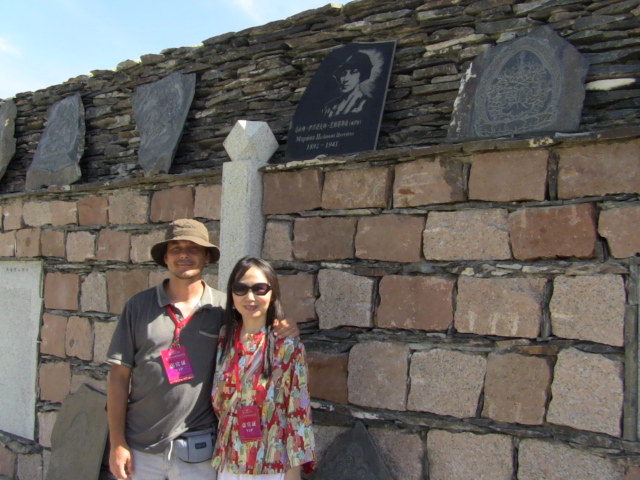


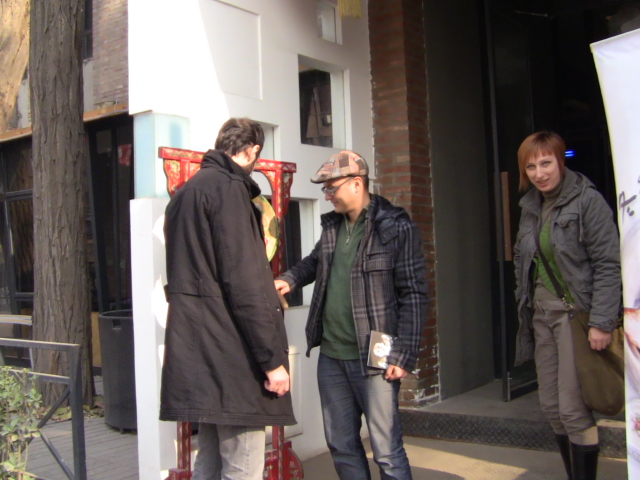





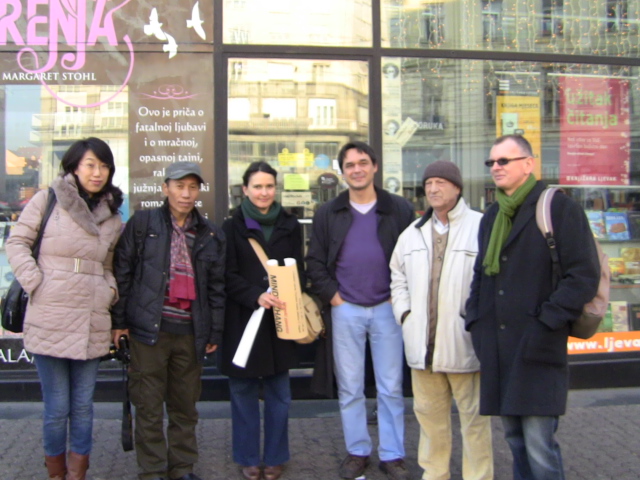
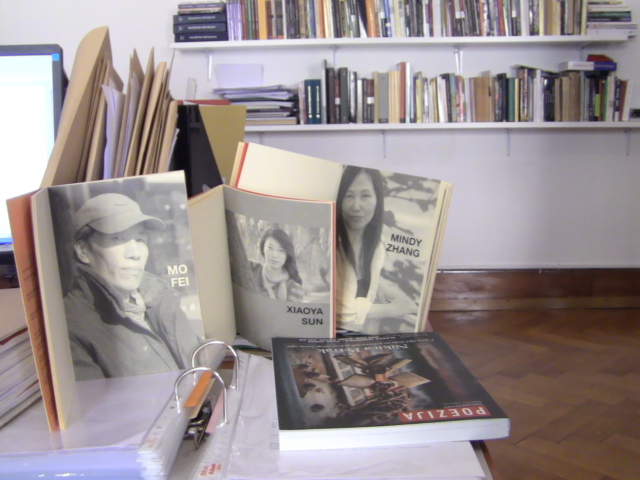
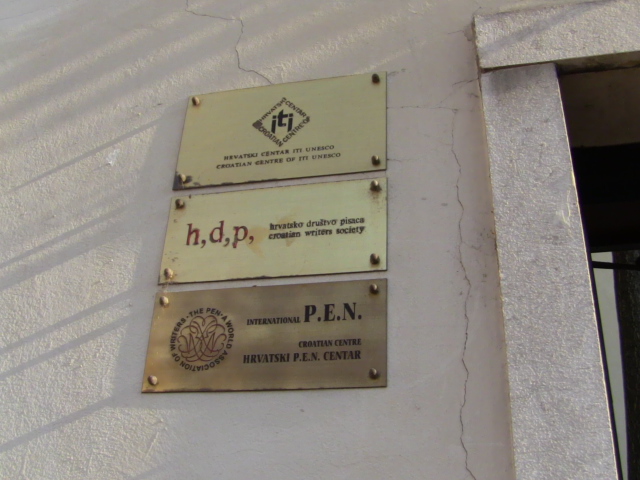

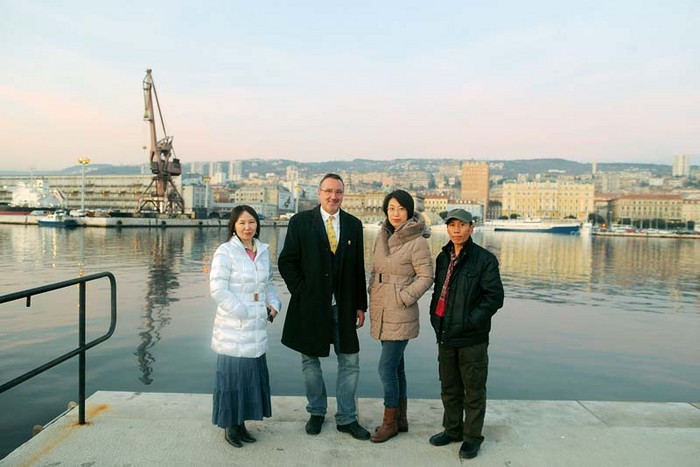
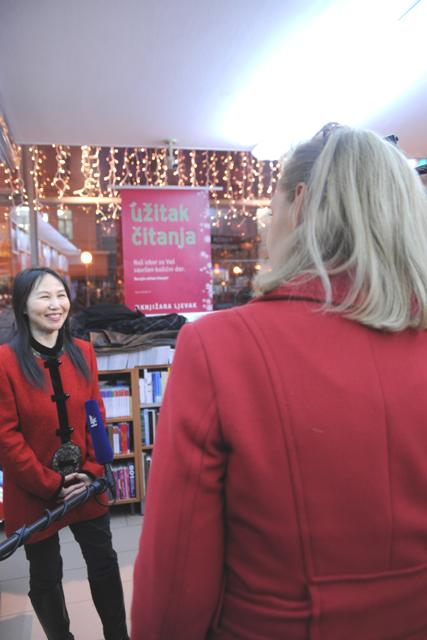

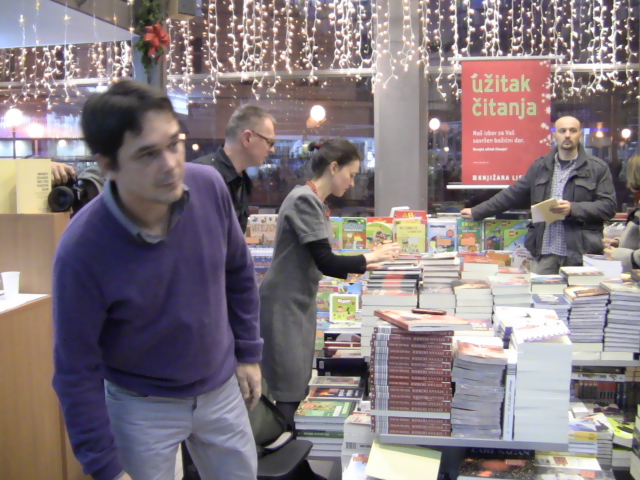

Pingback: Croatian-Chinese Poets Exchange – Poetry East West | Tomica Bajsić
Pingback: Croatian Poets Visiting China | Poetry East West